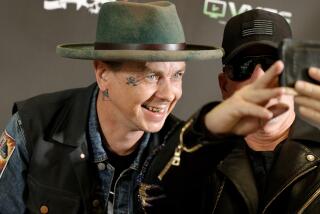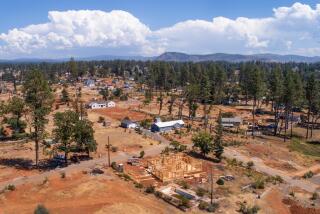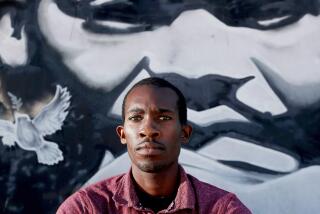Survivor Serves Up a Hearty ‘Thanks’
When Todd and Lori Robinson were planning Saturday’s barbecue for all those who helped them through their ordeal, Todd insisted that they hold it at their Gardena home.
Lori preferred a public park. As many as 200 people might show up--how, she wondered, could they be accommodated in the Robinsons’ small backyard with its single picnic table and lone barbecue grill?
“But Todd made up his mind to do it at home. He thought it would be more personal and people would feel more comfortable that way,” she said last week. “I don’t know--100 or 200 people! But that’s Todd. He always thinks everything will work out.”
Things, in fact, have worked out for Todd Robinson, whose near-fatal scalding and torturous recovery were chronicled in a Times serial, “After the Burn,” published in late December.
A year after his accident at the dairy where he worked--the anniversary was Thursday--the 32-year-old finds that his extensive scar tissue has softened and that his prospects for a full life have solidified. Saturday’s barbecue was a way of marking his decisive coming-around.
At the gathering, attired in a shirt depicting rows of beer bottles, he roamed amid a throng of party-goers, while a rock band named Pawn Shop played in the backyard and small children frolicked in an inflatable bounce chamber. Those whose cars lined the street on both sides included people who had cared for him in the burn center, baby-sat his children, fed his Rottweiler and maintained his house while he was fighting to recover.
“Basically, I did it to say thanks,” he said, as well-wishers greeted him with hugs and handshakes. “I had so many people who helped, and Lori said, ‘Who are you going to invite?’ I said, ‘Everybody.’ ”
The period covered in The Times articles ended last fall. At that time, Robinson was struggling with the restricted mobility caused by his stiffly healed third-degree burns, which covered nearly 70% of his body. The limitations changed his self-image and distanced him somewhat from his wife, who was beset by her own delayed emotions from the ordeal.
Since then, his physical flexibility has grown. He has been able to water-ski with his friends, snow-ski with his wife, and in-line skate with his 7-year-old son, Cody. He has also taken over many of the family’s domestic duties. Now the couple’s marital and family relations are closer than ever, they say.
“Todd and I came to terms with a lot of things,” his wife said. “Now he’s always looking out for me and what I want and what I like and what’s going to make things easier for me.”
“We’re a team,” Todd said. “Lori and I are doing great.”
He is undergoing a three-part regimen to soften and flatten his scars, which are most pronounced on his thighs and upper right arm. At the Grossman Burn Center at Sherman Oaks Hospital, he has received multiple injections of steroids beneath the skin.
Three times a week, nurses at the hospital’s rehabilitation center “mobilize” his scar tissue with a special suction machine. He also wears tight-fitting compression garments that inhibit scar growth. In the future he may have cosmetic surgery.
The hot water that scalded him spared his face and hands, but rumpled and discolored him, front and back, from the knees up. For a time after his return home, he was loath to view himself shirtless in a mirror. Since, he has begun making peace with how he looks.
“I look at myself, whether I like what I see or not,” he said. “But I’m not going to show it off. We all look in the mirror and see things we’d like to fix. I can wear shirts comfortably in public, but I always wore tank tops in the summer. Now I probably wouldn’t, because I don’t want people to start staring and looking. But, who knows? Maybe someday I’ll be able to wear those too.”
Part of his psychological recovery, he said, is visiting burn center patients, especially those the nurses tell him need cheering up. He talks with them candidly about their pain. He commiserates with them about the woes of living with a stomach feeding tube. As the survivor of a major burn, he has special credibility with them.
“I remember burn survivors talking to me when I was lying there in bed all wrapped up like a mummy,” he said. “It helped me to see them having gotten better, and walking and talking and acting fine.”
While in the midst of the medical struggle, Robinson typically was either so drugged with painkillers or focused on the everyday tasks of getting better that he didn’t entirely grasp the life-threatening nature of his injury. These days, delayed reactions set in unexpectedly.
“After reading the articles, it really dawned on me what happened,” he said. “Now when I see a corpse on a TV show or something, it gives me a sinking feeling--I could have been a corpse. And I wonder what would be going on with my family if I had died. Now that I’m getting better, I think more of what could have been.”
The Robinsons have filed a lawsuit against three companies involved in the design, manufacture and installation of the No. 3 pasteurizing unit at Jersey Maid dairy in the City of Commerce. A large stainless steel pipe in the unit burst, knocked Robinson from a 7-foot ladder and gushed hot water onto him. The suit, filed in Los Angeles Superior Court, seeks unspecified damages.
Under California law, he cannot sue his employer, a subsidiary of Vons. Since his accident, Jersey Maid has been making up the difference between his ordinary earnings and the $490 a week in state disability pay he has been receiving.
Although he intends to return to work within three months, he is apprehensive about the prospect.
“I have a fear of the pipes--all pipes in general,” he said. “I sometimes think, ‘What if it happened again?’ I’m scared of the one area, the processing area, where this happened. I don’t know if I’ll ever be able to go up on that same ladder again.”
To the Robinsons’ concern, their older son still refuses to discuss his father’s accident and hospitalization.
Cody had to live with friends and relatives during the six weeks of his father’s initial hospitalization, while his mother and then-infant brother stayed at an apartment near the burn center. Cody later admitted to a nurse-psychologist that he didn’t know for certain his father would live until the day Robinson walked haltingly from the hospital for the drive home.
“I sometimes ask [Cody], ‘Do you remember when Dad was in bandages?’ ” Lori said. ‘He’ll say, ‘I don’t want to talk about it. It makes me cry, and it makes me feel bad. Don’t you see the water in my eyes?’ ”
For Todd, being at home has been particularly gratifying because it has allowed him to make up time lost with his sons, especially 15-month-old Dylan, who was barely 3 months old when the accident occurred.
“There was all that time in the hospital, and even after I was home I couldn’t hold him,” Robinson said. “I missed out on a good seven or eight months of his life. Heck, he didn’t even know me. But he knows me now. Now we’re able to do things as a family again without having to make special allowances because of the way I was. Things are getting back to normal.”
More to Read
Sign up for Essential California
The most important California stories and recommendations in your inbox every morning.
You may occasionally receive promotional content from the Los Angeles Times.










